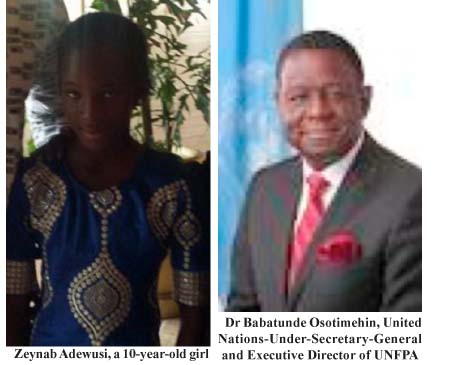
The
United Nations Population Fund (UNFPA) yesterday launched the State of the
World Population 2016 held at the Kairaba Beach Hotel, with a particular focus
on a 10-year-old girl.
This
year’s theme is: “10: how our future depends on a girl at this decisive age.”
“When
a girl reaches 10, her world changes:”
A
flurry of life-changing events pulls her in many directions. Where she ends up
depends on the support she receives, and the power she has that shape her own
future.
In
some parts of the world, a 10-year-old girl, on the verge of adolescence, sees
limitless possibilities ahead and begins making choices that will influence her
education and, later, her work and life.
But
in other parts of the world, a 10-year-old girl’s horizons are limited.
As
she reaches puberty, a formidable combination of relatives, figures in her
community, social and cultural norms, institutions, and discriminatory laws
block her path forward.
By
age 10, she may be forced to marry. She may be pulled out of school to begin a
lifetime of child-bearing and servitude to her husband.
At
10, she may become property, a commodity that can be bought and sold.
At
10, she may be denied any say in decisions about her life.
At
10, her future is no longer hers. It is determined by others.
Impeding
a girl’s safe, healthy path through adolescence to productive and autonomous
adulthood is a violation of her rights. But it takes a toll on her community
and nation.
Whenever
a girl’s potential goes unrealized, we all lose.
Conversely,
when a girl is able to exercise her rights, stay healthy, complete her
education and make decisions about her own life, she and everyone around her
wins.
She
will be healthier and if she later chooses to start a family, her children will
be healthier.
She
will be productive and make a better living and in turn make the world a better
place.
The
new United Nations 2030 Agenda for Sustainable Development Goals and it
accompanying 17 Sustainable Development Goals aimed for equitable, inclusive development
that leaves no one behind.
The
15-year plan promises to help transform the futures of millions of 10-year-old
girls, who have traditionally been left behind.
At
the same time, many of the sustainable development goals may only be achieved
if everyone’s potential, including that of all 10-year-old girls, is realized.
Chief
among the goals is a vision for a world without poverty. But how much progress
can we expect of the enormous potential of girls remains stiffed and
squandered?
In
many years, a 10-year-old girl’s life trajectory will be the true test of
whether the 2030 Agenda is a success or failure.
With
support from family, community and nation, and the full realization of her
rights, a 10-year-old girl can thrive and help bring about the future we all
want.
What
the world will look like in 15 years will depend on our doing everything in our
power to ignite the potential of a 10-year-old girl today”, said Dr Babatunde
Osotimehin, United Nations-Under-Secretary-General and Executive Director of
UNFPA.
Zeynab
Adewusi, a 10-year-old girl, in her statement, said: “We hear you adults always
telling us that we are the future leaders; that you are building this world for
us so that we can achieve our dreams and aspirations, and be able to support you
in your old age. In a few years, in 2024, I and other 59 million 10-year-old
girls would turn 18 years; we would be adults, but our journey from adolescence
to adulthood starts now. The support governments, parents, communities, and
concerned adults give these 60 million 10-year-old girls would be the main
determinant of the type of collective future we share.
“This
world population report encourages you to assure us a brighter future, one that
will enable us realize our fullest potentials. We know our journey to adulthood
is faced with numerous barriers such as increased risks and vulnerabilities;
impediments to health and well-being; violence; limited access to education;
uneven protection of human rights and economic obstacles.”
However, “we know the government of The Gambia
is committed to the cause of children and will continue to provide us the
opportunities to flying higher.
“As
a 10-year-old girl, like my age mates, we are capable of rapidly absorbing
wisdom and knowledge from those around us. When you support us, we can become
great and committed leaders, productive workers, innovators, caring parents,
and very responsible citizens who can move forward thriving, dynamic societies.
“We
urge you to develop policies and institutions which would build 10-year-old
girls as human capital through provision of quality education and access to
health information and services.”


